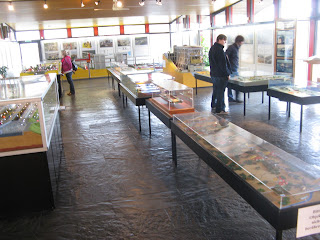Beginning Reformation Sunday with a German Lutheran service was definitely special. It's not very often Martin Luther's Ein Feste Burg (A Mighty Fortress) is sung in German and accompanied by a brass choir. But that was just the morning. The rest of my day was even cooler.
The first time I went to church in Lüneburg, I was welcomed warmly by everyone, but especially by Herr und Frau Wilkens. They invited me to sit with them, and helped me find the liturgy and psalms (that everyone else has memorized of course) in the hymnal. Because of both of our travel schedules, yesterday was the next time we were all together at church, and I was invited to spend the afternoon with them!
They took my to their house in Adendorf, a smaller town just north of Lüneburg (there really is no separation between the two). I talked with Herr Wilkens about traveling, history, and other things while Frau Wilkens prepared the afternoon meal. I was served home-cooked beef roast, with steamed potatoes and garden-fresh vegetables, and citrus yogurt for desert!
After the meal, Herr Wilkens took me to the Schiffhebewerk Lüneburg in Scharnebeck, a short drive through the beautiful fall-colored countryside. Lüneburg lies on the canal that connects the River Elbe to the larger Mittelland Canal, offering ships passage thanks to the largest ship lift in Germany. The lift works similar to a lock (like those found in Sault Ste. Marie, MI). Instead of raising or lowering a ship over the terrain by changing water level in the chamber, this ship lift hoists the entire trough, which weighs almost 6,000 tons. The Lüneburg ship lift has two troughs that operate independently, and move a ship through the lift in around 20 minutes. The 38-meter vertical journey takes 3 minutes.
http://www.schiffshebewerk-scharnebeck.de/index.php?option=com_content&task=view&id=16&Itemid=30
While the ship lift is most-certainly worth seeing by itself, especially if you are mechanically inclined, the exhibition hall is definitely a must-see. The hall features working models (with incredible detail) of the various types of ship lifts and locks found across Europe. It was amazing how many different methods are used to traverse elevation changes in a cargo ship: locks, single and double lifts, escalator-like slides, and an apparatus like a Ferris wheel.
The Wilkens were surprised (I think pleasantly) by how much of Lüneburg's historic inner city I have already seen and experienced. They were glad to show me some "out of the way" sights, like the ship lift and the Kloster Lüne (Lüneburg Abbey), our next stop.
The Kloster Lüne is only opened for guided tours, which are only given during the warmer seasons. Normally, the tours would have ended a couple weeks ago. However, this fall has been unusually warm, and so the tour season was extended (just for me!). The abbey buildings, most of which were built in the 14th Century, are still in use, with a few rooms set aside for preservation and tours. Some of the furniture inside dates from the 1100s! We toured the dining hall, the kitchen, the cemetery completely enclosed by the abbey buildings, and of course the sanctuary.
After the Kloster Lüne tour finished, our guide (a school friend of Frau Wilkens) showed us the Textile Museum as well. Built in 1995, the museum houses tapestries and rugs sewn in the abbey. Completely naturally died and stitched with fishing hooks, many of the tapestries depict the life story of saints. One piece featured a three-dimensional relief of the the crucified Christ; His body was made out of stale bread sewn to the backing fabric! We finished our visit to the Klöster Lüne with coffee and cake with our guide at the cafe in the courtyard.
Photography was not allowed on the Kloster Lüne tour, but Herr Wilkens gifted me with a guide to the abbey's history complete with color photo illustrations. The Wilkens also gave me two books about Lüneburg: one is a self-guided tour, mainly of the historic inner city, and the other is a collection of newspaper articles, published locally, each describing a different district of Lüneburg. I cannot say enough how wonderful it was to be so personally welcomed! I was able to converse in German with the Wilkens all afternoon, and got to see great things I would otherwise have missed. A big thank you to Herr und Frau Wilkens for a wonderful Sunday!








Das ist ja echt wunderbar! Toll, mein Herr, sehr toll! Es freut mich so das du ein Teil Deutschlands gut erlebst! Es ist auch für mich sehr Spaß über alle deine Erfahrungen zu lesen! Machs gut! Herr Huesmann
ReplyDeleteBTW... they sing "Ein Feste Burg" in German with brass every year there. ;o) Just sayin...